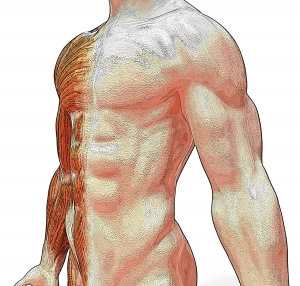Core Muscles, Spinal Stability and Posture
Strengthening Your Core can Improve Eye/Text Tracking
Some dyslexic people seem to have poorer posture, which may be due to weak core muscles. Recently a growing body of research has been focusing on dyslexia and posture.
For me one of the most annoying symptoms of dyslexia was my eyes jumping around when reading. When I came across research linking it to spinal stability I checked how strong my core strength was. I found I had trouble doing the most basic of the spinal stability exercises.
After building my core strength it’s so much easier for my eyes to track text clearly. This problem may have stemmed from infancy. Like many dyslexic people I didn’t crawl when I was a baby. This may have instigated poor core and posture development.
Wobbly eyes:
All of my life my eyes have wobbled across text when reading. My left eye was generally the worst; it would flicker up to the left. This as you may know is one of the most, teeth-grindingly, irritating symptoms of dyslexia. It may also be the reason why letter movement and reversal are common symptoms of dyslexia.
Core muscles:
When I came across the core/posture research I thought I had to try to use this (see evidence). I found I was not able to do the very basic of the core exercises. I consider myself in good health; I try to exercise whenever I can be bothered. My lack of core strength was not visually noticeable; however I did have a tendency to slouch.
Core stability and posture is related to the strength of the muscles in your tummy, across your lower back and bum. You might not know that they are working, but these muscles must switch on every time you take a step, move your arms or turn your head. Click here for more information about core muscles.

Core muscle development in infancy:
In my opinion (not that anyone cares about my opinion), poor posture may be linked to some dyslexic children not crawling during infancy. Some of the exercises to correct posture are based on the crawling position of a child. This may be an indication of crawling being the foundations for developing core stability.
Core exercises make it easier to read:
Since doing posture/core exercises, it has become so much easier for my eyes to move across text. I’m now starting to see how easy reading must be for the average person. These exercises will of course cost you NOTHING.
The exercises are easy, low impact and should only take a couple of minutes each day. Plus, they should make you feel really good afterwards! Adults or kids can do them, however if you do have any medical problems, please, speak to your doctor before beginning any new exercise programme.
Click here for a core exercise programme specially developed for dyslexic people.
Conclusion:
An inability to track words clearly maybe a corner stone of dyslexia for some people. If words are harder to track they may be more difficult to remember and structurally internalise. This would obviously corrupt the foundations for developing literacy.
There seems to be a possible link between not crawling as an infant and dyslexia. Though, this needs to be established properly by experimental research.
However who cares? I get a lot more out of reading now that it’s easier for my eyes to track the text. Not only has my speed increased, but I now get so much more pleasure out of it. Click here to find out about more possible causes of dyslexia.
Return from Core Muscles to Home Page.
Evidence Related to Core Muscles and Posture:
Follow-up of an exercise-based treatment for children with reading difficulties. .Static postural control in children with developmental dyslexia. .
Effects of dyslexia on postural control in adults. .
Impaired balancing ability in dyslexic children. .
Postural control in dyslexic and non-dyslexic children. .